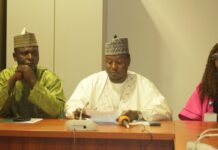Stakeholders in the Education sector on have endorsed the Bills seeking to establish the National Youth Service Corps (NYSC) Trust Fund and Youth Entrepreneurship Development Trust Fund.
The stakeholders who gave their support at the public hearing on the two bills organized by the House of Representatives Committee on Youth Development hearing said it will help to address unemployment crisis.
The proposed legislations, titled, “a Bill for an Act to establish the National Youth Service Corps Trust Fund and a Bill for an Act to make provision for establishment of Youth Entrepreneurship Development Trust Fund were sponsored by Hon. Samuel Akinfolarin and Hon. Farah Dagogo respectively.
In his presentation, the Director General NYSC, Maj. Gen. Shuaibu Ibrahim emphasised the need for the Trust Fund, saying that if established, it will engage and empower corps members at the end of the service by making them self reliant.
While noting that corps members are willing to put their best once supported, he appealed to Nigerians to support the bill.
Also, a Former Governor of Edo State, Osunbor Oserheimen while pledging his support to the bills, stressed the need for attention to be paid for its sourcing.
“This Bill is commendable and I support its passage by the National Assembly. Nevertheless, I urge this Committee to pay particular attention to the sourcing and utilisation of funds part of which I have addressed.
This is to avoid the abuses that have been associated in recent times with Trust Funds by officials who see them as slush funds to feed their avarice. This calls for caution in order that the good intention behind this Bill is not defeated,” he said.
In his remarks, the Chairman House Committee on Youth Development, Hon. Yemi Adaramodu said the Bill is going to engage youth to bring development.
He called for training and retraining of NYSC staff and skills acquisitions for corps members.
Earlier while declaring the hearing open, the Speaker of the House of Representatives, Hon. Femi Gbajabiamila, urged his colleagues to ensure that their recommendations consider all the prevailing circumstances and reflect the well-thought-out contemplation of objective realities and alternatives.
Represented by the House Leader, Hon Alhassan Ado Doguwa, Gbajabiamila while noting that the objective of both Bills are laudable, however said the lawmakers should circumspect in consideration of proposals that impose a permanent obligation on limited public funds, given that the nation is borrowing heavily to meet the basic obligations of government.
He said, “Both Bills, in their own way, seek to create opportunities for economic and social advancement for young people by offering skills acquisition opportunities and providing access to capital to actualise entrepreneurial ambitions. These are both laudable objectives. The NYSC trust fund Bill recognises that the NYSC is a significant cost centre for the Federal Government of Nigeria.
And at a time of competing priorities dwindling resources, the Corps may not be sustainable in its present form. The Bill is an attempt to begin an essential and long-overdue conversation about the future of the National Youth Service Corps and the options for reforming the Corps so that in whatever form it continues to exist, it serves the best interests of our beloved country.
I believe, and I have expressed this belief in different fora, that the most pressing public policy question of our time is how to ensure the economic, political and social future of the teeming number of young people in the country.
“How do we build an economy that provides enough well-paying jobs and ensure that young people are adequately represented in the arena where political decisions are made? As legislators, we must continue to strive to find answers to these questions.
But we must also be innovative in the proposals we make and the alternatives we consider for reform. Particularly, we must be circumspect in our consideration of proposals that impose a permanent obligation on limited public funds when we are borrowing heavily to meet the basic obligations of government.”














































